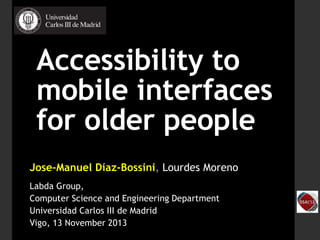Accessibility to mobile interfaces for older people
- 1. Accessibility to mobile interfaces for older people Jose-Manuel D¨ªaz-Bossini, Lourdes Moreno Labda Group, Computer Science and Engineering Department Universidad Carlos III de Madrid Vigo, 13 November 2013
- 2. Contents ? Introduction and Motivation ? Background ? Proposal ? Conclusions and Future Work 2
- 3. Introduction and Motivation ? Exponential growth of the elderly population that suffers from age-related disabilities ? This problem will be even bigger when middle-age population becomes the new elderly population. ? New technologies and devices evolves faster than accessibility issues are addressed 3
- 4. Background ? Accessibility and older people ? There is a lack of accessibility guidelines in the mobile applications context: literature, best practices and guidelines. ? W3C is working on providing guidance to apply its Web Content Accessibility Guidelines (WCAG) via the Mobile Web Application Best Practices (MWABP) and Mobile Web Best Practices (MWBP) 4
- 5. Proposal ? A set of guidelines to keep in mind in order to achieve accessibility in mobile interfaces for older people. ? An accessibility study of three mobile native Apps on android that modify the default interface for another more accessible one. 5
- 6. Proposal Accessibility guidelines ? Accessibility guidelines of mobile Apps for the elderly ? We propose an Accesibility Checklist for mobile Apps for the elderly : set of 17 checkpoints collected from 3 source research works: ¢Ù World Wide Web Consortium (W3C) guidelines. ¢Ú Android Accessibility Practices. ¢Û Age-centered Research-Based Design Guidelines (2005, Panayiotis, Z. et al.) 6
- 7. Proposal Accessibility guidelines ¢Ù W3C criteria (7 criteria): ? Providing a text equivalent for every non-text element ? Use clear and simple language ? Do not create periodically auto-refreshing pages, unless you have informed the user and provided a means of stopping it 7
- 8. Proposal Accessibility guidelines ¢Ú Android Accessibility Practices (4 criteria) ? Add descriptive text to user interface controls ? Audio prompts accompanied by another visual prompt or notification ¢Û Age-centered Research-Based Design Guidelines (6 categories) ? Provide larger targets ? Provide ample time to read information ? Highlight important information 8
- 9. Proposal An accessibility study of mobile Apps ? EXPERIMENTAL DESIGN 1. Object of study: ? An accessibility evaluation of 3 mobile native Apps that modify the default interface, turning it into a more accessible and friendly one for elderly people 2. Experiment Context ? Nexus 4 Smartphone with Android 4.2.2. ? TalkBack services ? Explore by Touch system feature 9
- 10. Fontrillo Mobile Proposal An accessibility study of mobile Apps Big Launcher 10 Accessibility for Android 3. Sample Apps:
- 11. Proposal An accessibility study of mobile Apps 4. Study parameters ? Accessibility Checklist 5. Evaluation method ? Each checkpoint was manually tested and pointed between 1 and 5. ? The final result is the average between them. 11
- 12. Analysis and Results CHECKPOINT BIG LAUNCHER FONTRILLO THE MOBILE ACCESSIBILITY FOR ANDROID W3CP001 5 5 5 W3CP002 5 2 4 W3CO001 2 2 5 W3CO002 3 4 4 W3CU001 5 5 4 W3CU002 4 3 4 W3CO003 4 5 4 Android001 5 2 5 Android002 3 3 3 Android003 4 3 4 Android004 5 3 3 WDG-TD 5 5 2 WDG-UG 5 4 2 WDG-BWF 2 2 2 WDG-CLD 4 4 2 WDG-UCD 5 4 3 WDG-UCB 4 5 3 Final Score 4,11 3,58 3,47 12 Proposal An accessibility study of mobile Apps
- 13. 13 Proposal An accessibility study of mobile Apps ? Summary and Interpretation of Findings ? The results of study indicate Big Launcher is the most accessible for older people of the three applications. ? In the medium term, we¡¯ve got Frontillo. It accomplish with many of the criteria established. ? The accessibility for Android App is a good application but it focuses mainly on blind people, so it¡¯s not the best option for older people.
- 14. Conclusions ? From this study, we provide: ? A checklist of accessibility guidelines to evaluate mobile Apps for elderly people ? Evaluation of three mobile native Apps that modify the default interface, turning it into a more accessible for elderly people ? Apps should be accessible in order to prevent social exclusion and to encourage the access of elderly and disabled people to the technologies ? Accessibility requirements should be addressed early on the design phase in the development process. ? Future work 14
- 15. 15 Jose-Manuel D¨ªaz-Bossini, Lourdes Moreno Universidad Carlos III de Madrid THANK YOU FOR YOUR ATTENTION















